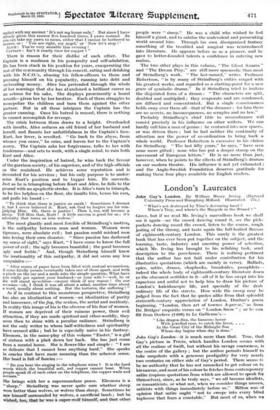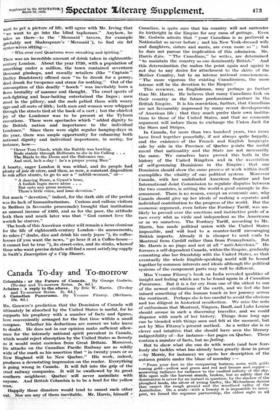London's Laureates
" What's not destroyed by Time's devouring hand ? Where's Troy, and where's the Maypole in the Strand " GONE, but if we read Mr. Irving's marvellous book we shall see it again—see the crowd dancing round it, see the pick- pockets dancing round the crowd, listen to the coarse, rough jesting of the throng, and taste again the full-bodied flavour
of eighteenth-century London. This surely is the greatest
book that has ever been put together on the subject, and the learning, taste, industry and unerring power of selection,
which Mr. Irving has brought to his relishing task, send description to the poor-house. There is nothing pertinent that the author has not laid under contribution for his
illustrative quotations (which are mainly in verse). Ballads, epics, satire, drama, chapbooks, broadsides, pamphlets— indeed the whole body of eighteenth-century literature down to the obscurest scribbler in it—all of it he has swept into his capacious and artful net to help him to draw his picture of London's kaleidoscopic life, and specially of the drab ordinary life of the streets. How wide the sweep may be judged from the fact that he quotes alike from that splendid sixteenth-century appreciation of London, Dunbar's poem beginning, "London, thou art of townes A-per-se," as from Dr. Bridges' exquisite verses on " London Snow " ; or he can flit from Oceleve (1406) to Le Gallienne's- " Like dragon-flies, the hansoms hover
With jewelled eyes, to catch the lover, . . In the Great City of the Midnight Sun Whose day begins when day is done."
John Gay's London—it is much more than that. True, that Gay's picture in Trivia, which handles London scenes with all the realism of Swift, but without his savage coarseness, is the centre of the gallery ; but the author permits himself to take snapshots with a generous prodigality for very nearly two centuries on either side of Gay's period. There seems to be no authority that he has not ransacked to get colour on tq his canvas, and most of his colour he fetches from contemporary satire (copious quotations from which are allowed to speak fox themselves), since, as he truly says, " we all become idealists, or romanticists, or what not, when we consider things unseen, satirists with things immediately before us." Milton was of opinion that satire ought " not to creepe into every blind taphouse that fears a constable." But most of us, when we want to get a picture of life, will agree with Mr. Irving that " we want to go into the blind taphouses." Anyhow, he takes us there—to the ' Mermaid ' tavern, for example (probably not Shakespeare's ' Mermaid '), to find six fat oyster-wives sitting-
" Who over cool Quarterns were smoaking and ipitting."
There was an incredible amount of drink taken in eighteenth- century London. About the year 1730, with a population of something under a million, the town contained seventeen thousand ginshops, and rascally retailers (like " Captain " Dudley Bradstreet) offered men "to be drunk for a penny, dead drunk for twopence and straw for nothing." Out of the consumption of this deadly " hooch " was inevitably born a fierce brutality of manner and thought. The cruel sports of cock-fighting and bear-baiting entertained the lieges ; men stood in the pillory, and the mob pelted them with weary eggs and all sorts of filth ; both men and women were whipped through the streets tied at the back of a cart ; but the chiefest joy of the Londoner was to be present at the Tyburn executions. These were spectacles which " added dignity to the British nation and importance to the individual Londoner." Since there were eight regular hanging-days in the yEnr, there was ample opportunity for enhancing both national dignity and individual importance, in seeing, for instance, how- " Clever Tom Clinch, while the Rabble was bawling, Rode stately through Holbourn to die in his Calling The Maids to the Doors and the Balconies ran, And said, lack-a-day ! he's a proper young Man."
A hearty, eager London it was withal, and its people had plenty of joie de vivre, and then, as now, a constant disposition to run after stunts, to go to see a " rabbit-woman," or-
" A dancing Beam, a Gyant's bone,
A foolish Win move alone . . .
But unto any pious motion, There's little coin, and Jesse devotion."
Not much " devotion," indeed, for the dark side of the period was its lack of humanitarianism. Curious and callous visitors to Bedlam (a favourite promenade) brought that institution an annual income of £400, and as for the poor, the attitude both then and much later was that " God cannot love the wretch he starves."
The book of this American writer will remain a locus classicus for the life of eighteenth-century London—its amusements, its rakes (" drabs, dice and drink his onely joyes "), its coffee- houses (if you want the news, " go hear it at a Coffee-house— it cannot but be true "), its street-cries, and its stinks, whereof those who want precise details will find a most satisfying supply in Swift's Description of a City Shower.

















































 Previous page
Previous page